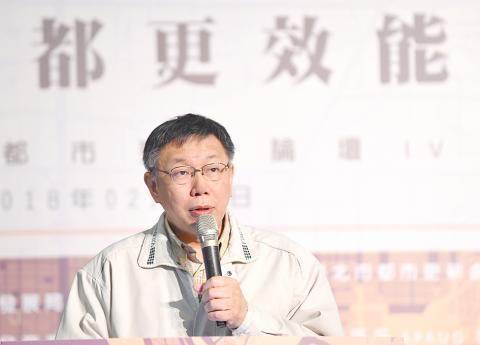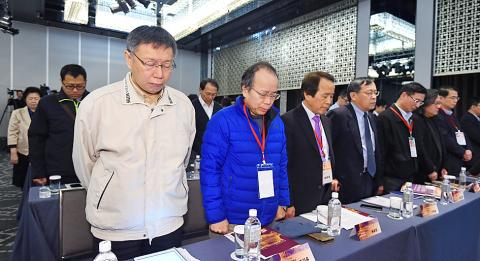Taipei must do more to encourage urban renewal, as it has about 600,000 residential units that are more than 30 years old, but only about 36,000 have been put into urban renewal projects, Taipei Mayor Ko Wen-je (柯文哲) said yesterday at a forum held by the Taipei Department of Urban Development.
Participants in the forum held a moment of silence in tribute to the victims of last Tuesday’s magnitude 6.0 earthquake in Hualien, which killed 16 people, injured 285 and left one person missing.
Although many people are concerned about the effects of a major earthquake on buildings and related urban renewal issues, the forum did not aim to focus on disaster prevention, but on effective urban renewal policy, Ko said.

Photo: Liu Hsin-de, Taipei Times
The city government in 2010 initiated a special project aimed at renewing old four-story or five-story apartment buildings by allowing the property owners to exchange “one ping” [3.3m2] for one ping” of a renewed building, but as of 2015, only three of 79 project applications had been approved and were under way, which indicated that the city’s policies needed to be overhauled, he said.
“The urban renewal policy has to change drastically, or else it would take more than 1,000 years to finish,” he said.
Urban renewal projects in Yongchun Community (永春) and Datong District’s (大同) Siwen Borough (斯文) are important milestones of the city’s urban renewal efforts, he said.

Photo: Liu Hsin-de, Taipei Times
However, the two cases were complicated, and the Yongchun Community project was stalled for 16 years, although construction there was expected to resume this week, while the Siwen project is expected to begin in May, the mayor said.
Property owners who are unwilling to participate in urban renewal projects is a national problem, but the old apartments should be entered into the process as soon as possible, hopefully within the next 10 years, he said.
In the meantime, the city will promote the importance of urban renewal in improving disaster prevention, he said.

AGING: As of last month, people aged 65 or older accounted for 20.06 percent of the total population and the number of couples who got married fell by 18,685 from 2024 Taiwan has surpassed South Korea as the country least willing to have children, with an annual crude birthrate of 4.62 per 1,000 people, Ministry of the Interior data showed yesterday. The nation was previously ranked the second-lowest country in terms of total fertility rate, or the average number of children a woman has in her lifetime. However, South Korea’s fertility rate began to recover from 2023, with total fertility rate rising from 0.72 and estimated to reach 0.82 to 0.85 by last year, and the crude birthrate projected at 6.7 per 1,000 people. Japan’s crude birthrate was projected to fall below six,

US President Donald Trump in an interview with the New York Times published on Thursday said that “it’s up to” Chinese President Xi Jinping (習近平) what China does on Taiwan, but that he would be “very unhappy” with a change in the “status quo.” “He [Xi] considers it to be a part of China, and that’s up to him what he’s going to be doing, but I’ve expressed to him that I would be very unhappy if he did that, and I don’t think he’ll do that. I hope he doesn’t do that,” Trump said. Trump made the comments in the context

SELF-DEFENSE: Tokyo has accelerated its spending goal and its defense minister said the nation needs to discuss whether it should develop nuclear-powered submarines China is ramping up objections to what it sees as Japan’s desire to acquire nuclear weapons, despite Tokyo’s longstanding renunciation of such arms, deepening another fissure in the two neighbors’ increasingly tense ties. In what appears to be a concerted effort, China’s foreign and defense ministries issued statements on Thursday condemning alleged remilitarism efforts by Tokyo. The remarks came as two of the country’s top think tanks jointly issued a 29-page report framing actions by “right-wing forces” in Japan as posing a “serious threat” to world peace. While that report did not define “right-wing forces,” the Chinese Ministry of Foreign Affairs was

PREPAREDNESS: Given the difficulty of importing ammunition during wartime, the Ministry of National Defense said it would prioritize ‘coproduction’ partnerships A newly formed unit of the Marine Corps tasked with land-based security operations has recently replaced its aging, domestically produced rifles with more advanced, US-made M4A1 rifles, a source said yesterday. The unnamed source familiar with the matter said the First Security Battalion of the Marine Corps’ Air Defense and Base Guard Group has replaced its older T65K2 rifles, which have been in service since the late 1980s, with the newly received M4A1s. The source did not say exactly when the upgrade took place or how many M4A1s were issued to the battalion. The confirmation came after Chinese-language media reported